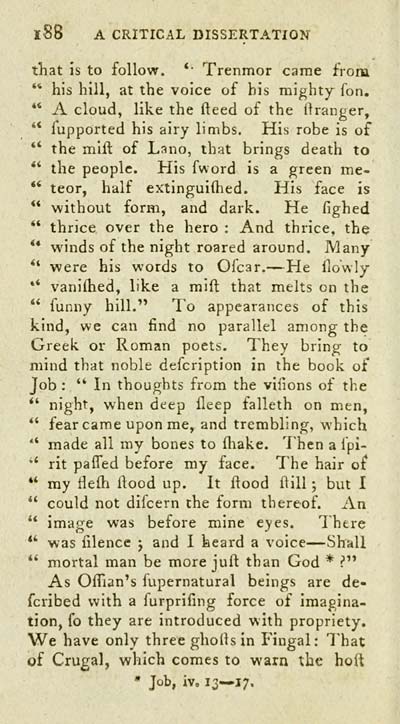Ossian Collection > Poems of Ossian > Volume 3
(196)
Download files
Complete book:
Individual page:
Thumbnail gallery: Grid view | List view

I«« A CRITICAL DISSERTATION
that is to follow. *• Trenmor came from
** his hill, at the voice of his mighty fon.
** A cloud, like the fteed of the Ihanger,
** fupported his airy limbs. His robe is of
" the mill of Lano, that brings death to
*' the people. His fword is a green me-
*' teor, half extinguiftied. His face is
" without form, and dark. He fighed
" thrice over the hero : And thrice, the
** winds of the night roared around. Many
*' were his words to Ofcar. — He fiowly
** vaniftied, like a mift that melts on the
** funny hill." To appearances of this
kind, we can find no parallel among the
Greek or Roman poets. They bring to
mind that noble defcription in the book of
Job : " In thoughts from the vifions of the
*' night, when deep ileep falleth on men,
" fear came upon me, and trembling, which
** made all my bones to fliake. 'I'hen a fpi-
•' rit paffed before my face. The hair o^
" my tiedi Hood up. It flood (lill ; but I
" could not difcern the form thereof. An
" image was before mine eyes. Thtre
*' was filencc j and I heard a voice — Shall
** mortal man be more juft than God * •"'
As Oflian's fupernatural beings are de-
fcribed with a furprifing force of imagina-
tion, fo they are introduced with propriety.
We have only three gholls in Fingal: That
of Crugal, which comes to warn the hoft
* Job, iv. 13—17.
that is to follow. *• Trenmor came from
** his hill, at the voice of his mighty fon.
** A cloud, like the fteed of the Ihanger,
** fupported his airy limbs. His robe is of
" the mill of Lano, that brings death to
*' the people. His fword is a green me-
*' teor, half extinguiftied. His face is
" without form, and dark. He fighed
" thrice over the hero : And thrice, the
** winds of the night roared around. Many
*' were his words to Ofcar. — He fiowly
** vaniftied, like a mift that melts on the
** funny hill." To appearances of this
kind, we can find no parallel among the
Greek or Roman poets. They bring to
mind that noble defcription in the book of
Job : " In thoughts from the vifions of the
*' night, when deep ileep falleth on men,
" fear came upon me, and trembling, which
** made all my bones to fliake. 'I'hen a fpi-
•' rit paffed before my face. The hair o^
" my tiedi Hood up. It flood (lill ; but I
" could not difcern the form thereof. An
" image was before mine eyes. Thtre
*' was filencc j and I heard a voice — Shall
** mortal man be more juft than God * •"'
As Oflian's fupernatural beings are de-
fcribed with a furprifing force of imagina-
tion, fo they are introduced with propriety.
We have only three gholls in Fingal: That
of Crugal, which comes to warn the hoft
* Job, iv. 13—17.
Set display mode to: Large image | Transcription
Images and transcriptions on this page, including medium image downloads, may be used under the Creative Commons Attribution 4.0 International Licence unless otherwise stated. ![]()
| Early Gaelic Book Collections > Ossian Collection > Poems of Ossian > Volume 3 > (196) |
|---|
| Permanent URL | https://digital.nls.uk/77527306 |
|---|
| Description | Volume III. |
|---|---|
| Shelfmark | Oss.41 |
| Attribution and copyright: |
|
| Description | London : printed for J. Mundell & Co. Edinburgh; and for J. Mundell, Glasgow, 1796. In 3 volumes. |
|---|---|
| Shelfmark | Oss.39-41 |
| Additional NLS resources: | |
| Description | Selected books from the Ossian Collection of 327 volumes, originally assembled by J. Norman Methven of Perth. Different editions and translations of James MacPherson's epic poem 'Ossian', some with a map of the 'Kingdom of Connor'. Also secondary material relating to Ossianic poetry and the Ossian controversy. |
|---|
| Description | Selected items from five 'Special and Named Printed Collections'. Includes books in Gaelic and other Celtic languages, works about the Gaels, their languages, literature, culture and history. |
|---|

